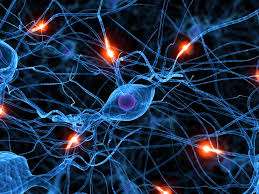记忆方法
将“nerve”与“ner”发音相似的字词结合,比如“near”,想象在神经系统的“near”区域,人们因为紧张或兴奋而感到“nerve”紧张。这种方法利用了相似发音的联想,帮助你记忆单词“nerve”的意思。
以上内容由AI生成, 仅供参考和借鉴
中文词源
nerve 神经,神经质,勇气,气魄
来自拉丁语nervus,跟腱,肌筋,来自PIE*sneu,跟腱,肌筋,来自PIE*sne,缝制,编织,词源同needle,net.后用于指人体的筋脉,引申词义神经,神经质,勇气,气魄等。
英语词源
- nerve
-
nerve: [16] Latin nervus meant ‘sinew, bowstring’. It and its Greek relative neuron (source of English neural) may belong to a wider family of words that includes Latin nēre ‘spin’ (a relative of English needle) and possibly also English narrow, perhaps with a common meaning element. The application to ‘bundle of fibres carrying sensory or other impulses’ seems to have begun in Greek, but was soon adopted into the Latin word, and was brought with it into English.
Metaphorically, the Romans used nervus for ‘strength, force’, an application perhaps lying behind the English sense ‘courage’, first recorded in the early 19th century. The use of the plural nerves for ‘agitation, apprehension’ (and of the adjective nervous [14] for ‘apprehensive’) is an English development, which probably started in the mid- 18th century.
=> needle, neural - nerve (n.)
- late 14c., nerf "sinew, tendon," from Old French nerf and directly from Medieval Latin nervus "nerve," from Latin nervus "sinew, tendon; cord, bowstring," metathesis of pre-Latin *neuros, from PIE *(s)neu- "tendon, sinew" (cognates: Sanskrit snavan- "band, sinew," Armenian neard "sinew," Greek neuron "sinew, tendon," in Galen "nerve"). Sense of "fibers that convey impulses between the brain and the body" is from c. 1600.
Secondary senses developed from meaning "strength, vigor, energy" (c. 1600), from the "sinew" sense. Hence figurative sense of "feeling, courage," first attested c. 1600; that of "courage, boldness" is from 1809; bad sense "impudence, cheek" is from 1887. Latin nervus also had a figurative sense of "vigor, force, power, strength," as did Greek neuron. From the neurological sense come Nerves "condition of nervousness," attested from 1792; to get on someone's nerves, from 1895. War of nerves "psychological warfare" is from 1915. - nerve (v.)
- c. 1500, "to ornament with threads;" see nerve (n.). Meaning "to give strength or vigor" is from 1749. Related: Nerved; nerving.
权威例句
- 1. Nerve cells have limited ability to regenerate if destroyed.
- 如果受到损伤,神经细胞再造的能力有限。
- 2. The mere mention of John had touched a very raw nerve indeed.
- 提到约翰就真的让人心痛。
- 3. He had the nerve to ask me to prove who I was.
- 他竟敢要求我证明我自己的身份。
- 4. The brandy made him choke, but it restored his nerve.
- 虽说白兰地呛了他一下,却让他恢复了勇气。
- 5. Malcolm worked up the nerve to ask Grandma Rose for some help.
- 马尔科姆鼓起勇气请罗丝奶奶帮点忙。

